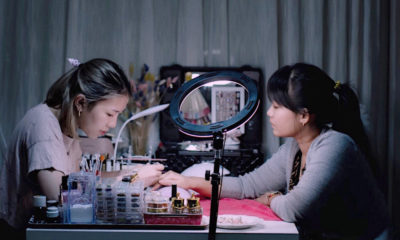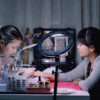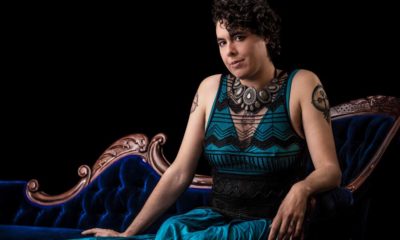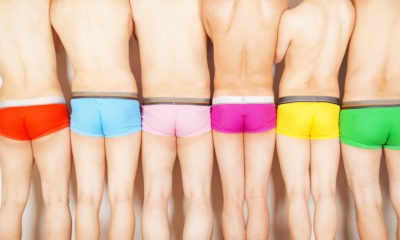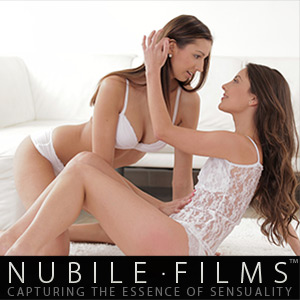LGBTQ
It’s Not You, It’s The Other Straight People: Heteronormativity, Allyship, and Trauma
A lot of people don’t understand why microaggressions wear marginalised folks down a lot. Many people also don’t understand why sometimes, queer personal politics mean that queer folks are constantly wary of allies and others who proclaim that they’re not oppressing you but supporting you instead. (Read: my personal politics are aligned along this vein too.) An incident that just happened to me illustrates the above two points exactly, so I hope people read this.
A while back, my three friends and I faced a dilemma about our bi-weekly movie night. Should we watch Pan’s Labyrinth, or The Way He Looks instead?
The only distinction we made between the two movies was this: the latter, The Way He Looks, was a gay film, and the former — Pan’s Labyrinth — was not. Of my three friends, one is gay (friend 3) and two are straight (friends 1 and 2). I consider myself queer on the twin axes of gender and orientation, and hence I strongly supported Friend 3’s request for The Way He Looks — Friend 3 rarely has movies he wants to watch, and I was heartily tired of seeing straight romances on-screen anyway.
Somehow, someone said: “We can watch Beauty and the Beast after watching The Way He Looks to recover.”
Usually, I’m privileged enough to forget that I’m in the company of straight friends because my (lack of a) sexuality/sexual orientation is a non-issue, and so is my (queer) romantic orientation. But sometimes, things like this crop up, and the usual plain sailing makes microaggressions, when they occur, all the more painful.
Friend 3: “Recover? You need to recover?”
Me: “They need to recover from seeing a relationship that doesn’t closely mirror their own desires on-screen, despite seeing relationships that match what they want everywhere and on-screen all the time.”
Friend 2: “Not recover. Recover was the wrong word.”
Me: “Really? Oh, maybe recalibrate then. You need to recalibrate your minds away from the gayness.”
Friend 1: “No… It’s just a gay movie, with a homosexual relationship…”
Me: “Gay. It’s a gay relationship. And why are you so uncomfortable with the idea of seeing a gay relationship on-screen when everyone expects those of us who aren’t straight to be ok with watching straight romance in a movie?”
Friend 2: “Why do I get the feeling that this is going to end with all of us not talking to each other.”
Me: “I’m just winding up Friend 1 and being mean, don’t worry.”
Friend 2: “But you’re being mean to me too…”
Me: “Ok! It’s the OTHER straight people, not you two! Other people!”
I didn’t think much of our conversation at the time, but it’s startling upon introspection, because it perfectly illustrates heteronormativity, allyship, and the concept of queer trauma.
~
(1) Heteronormativity
Heteronormativity is when a heterosexual relationship is deemed to be the norm — aka, when everyone is assumed to be straight, and everything around you (media, advertisements, products…) is catered for the straight masses — aka, status quo.
Heteronormativity leads to the assumption that because straight relationships are the (constructed!) “norm”, everyone should be alright with them. This relegates non-het relationships to the fringe, resulting in things like straight friends (Friends 1 and 2) never considering the possibility that Friend 3 and I could even be, maybe, just a tiny little bit uncomfortable with straight romances and sex scenes on-screen because it’s not an accurate representation of who we are and it’s compounded by how we’re constantly bombarded by these representations with which we have no recognition in real life and on-screen.
We either never see people like us, or see people like us portrayed negatively or the flat-out villain. And when you sideline our identities and the kinds of relationships we have and deem them “non-mainstream”, what are you telling us? That we’re unworthy of the same screen time or of seeing ourselves reflected back at us because of something pretty intrinsic within us? Thanks, heteronormativity. Thanks very much.
(2) Allyship
I’m referring mainly to the last two sentences in this conversation here:
“You’re being mean to me too…” and my reassuring reply “It’s other straight people.”
It is not about you. It is not about your feelings. Not when your feelings are the ones considered all the time. Not when you get to see people with similar feelings around you and reflected in art all the time.
Heteronormativity is something straight people benefit from because they have straight privilege, and my friends didn’t understand it. For them, their understanding of gayness starts and stops at their friends liking people of the same gender rather than a different (binary) gender. I’m not being mean to you when I’m telling you about what your privilege does for you. Being mean would be telling you that you’re scum because you’re privileged.
Why do I have to constantly reassure straight people (not just these two friends, either) that the kinds of behaviour and thought I dislike belong to OTHER straight people, and that I don’t include them when I say ” straight people, ugh”? They know their own personal politics best, and if they’re decent, they should be sufficiently secure in their own decency and not require the marginalised folks around them to hold their hands and tell them they’re wonderful human beings every single time privilege comes up.
If you consider yourself to be an ally, stop asking us to prop you up with kind words whenever you do something good. Or when you do something wrong, apologize and move on. You should be using your privilege to prop us up instead.
(3) Trauma
I really, really detest the notion that watching a queer relationship on-screen is traumatic for straight people. Unless, of course, they have a huge epiphany about how seeing straight romances literally every-fucking-where is incredibly traumatic for queer folks and shut up about it forever after that.
But straight people always have to have the last say (see: heteronomativity).
If you’re privileged enough to have your relationships reflected around you everywhere, viewing one piece of art that bucks the trend isn’t traumatic. This queer trauma belongs to us.
I’m getting a little tired of repeating this, but sometimes straight people just don’t get it. Why is it important that we have accurate, fair representation for queer people on-screen? Because sometimes media (like songs, movies, TV shows etc) are the only ways in which queerness is accessible for some queer people. It’s important for queer people (especially those just coming into their nascent queer identities) to know that they’re not a singular oddity in their area — there are other people, in other places, who feel similarly and have similar experiences. When you don’t show queer people on-screen, we’re erased.We’re invisible. We don’t exist, and it’s because the people with the money don’t think people like us are worthy of screen time.
And if you show queer people on-screen and you fall back on the time-honoured tropes of the “slutty bisexual” or the “HIV-positive gay man” or the “man-hating butch lesbian” or the “transgender sex worker”… If I had to count on fingers and toes the number of times that I’ve seen an L/G/B/T character being the punch line of a joke (thankfully, not the literal PUNCH line), I could round up all the people I know to borrow their digits and I still wouldn’t have enough. Do you have no creativity or decency at all, or are you just hell-bent on telling folks that being cishet is the only way to go? That’s incredibly detrimental, especially for closeted young queer youth who don’t have many sources of information. I remember thinking that I would be expected to grow up and fall in love with a man and turn feminine, because the storylines of TV dramas I watched as a child that featured tomboys or women who weren’t stereotypically feminine had them all follow the same trajectory. I was expected to grow up and fall in love with a man and be feminine — but what TV told me was that it was the only way. I had to figure out on my own that discarding this narrative was a viable path to take, too. (That took a long time and a lot more introspection, but that’s not the point of what I’m saying now.)
~
There is very real trauma caused by erasure. There is very real trauma caused by misrepresentation. There is very real trauma caused by the unintended incidents where people reinforce that we’re not the norm. And this trauma? It’s caused by heteronormativity. It’s caused by people misunderstanding allyship and perpetuating microaggressions instead of actual allyship. And this trauma is queer — it belongs to queer people and is actively done to queer folks, so please leave your privileged selves out of it and be glad you don’t know what the fuck we’re talking about.
For the original article please see https://medium.com/@in__flux/it-s-not-you-it-s-the-other-straight-people-heteronormativity-allyship-and-trauma-ef60de58d394
Image courtesy of Shutterstock
Have an amazing experience or tips you like to share on SimplySxy? Drop us an email at editorial@SimplySxy.com!
Kay is an asexual, genderqueer maybe-biromantic person. if that long muddle of words didn't make you shy away from this muddle of a person, you might consider finding them on twitter at @in__flux or emailing them at kay.influx@gmail.com. When not thinking (futilely) about moving to a utopia and consuming mogai-affirming fanfic, Kay is a lit major who detests the dead white men who infest the compulsory modules they grumble their way through. Click on the links below to follow him!









